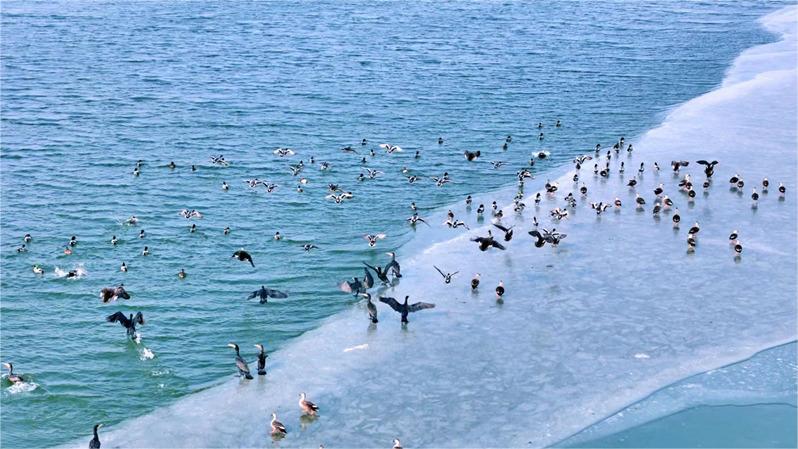Commentary: China, Europe reach out to each other in icy winter
BERN, Switzerland, Jan. 15 (Xinhua) -- Amidst the picturesque Swiss landscape draped in a pristine blanket of snow, a red carpet was unfurled on Sunday to welcome Chinese Premier Li Qiang, who chose Europe for his inaugural overseas visit in the new year.
The Swiss leg of Li's tour marks the commencement of high-level interactions between China and Europe in 2024. During his four-day trip, Li is slated to participate in the World Economic Forum (WEF) Annual Meeting 2024 and pay official visits to Switzerland and Ireland.
Li was received by President of the Swiss Confederation Viola Amherd at Zurich international airport. During their train journey from Zurich to the Swiss capital, Bern, the two leaders had a chat over tea "in a relaxing and friendly atmosphere."
Li told Amherd that "China will open its door wider and wider to the outside world and welcomes more Swiss investors."
While Davos, the venue for the WEF annual meeting, enjoys the limelight, Swiss media outlet SWI swissinfo.ch suggests that the most important meeting during Li's visit, from a Swiss perspective, could be the one taking place some 270 km away in Bern, where the Chinese premier is scheduled to hold more meetings with Amherd and other members of the Federal Council.
The WEF has highlighted Li's participation by placing his name first among the political leaders taking part. This year's WEF theme, "Rebuilding Trust," aligns with China's aspirations to increase exchanges and communication and enhance mutual understanding and trust with other parties in face of the "de-risking" rhetoric peddled by the U.S.-led West.
In Dublin, Irish Prime Minister Leo Varadkar said ahead of Li's visit to Ireland that the country recognizes China as a major country politically and economically and Ireland's "important economic partner," and looks forward to extending a "warm welcome" to Li and holding "in-depth and constructive discussions" with the Chinese guest, according to the Department of the Taoiseach.
The emphasis on Li's visit can be partially explained by the value placed on certainty in this uncertain world. For many European countries, one thing they can be certain about is that their cooperation with China has been mutually beneficial.
The Chinese market holds significant importance for Europe's post-pandemic recovery. In 2022, China-EU trade reached 847.3 billion U.S. dollars, implying that in every minute, trade exchanges between China and the EU valued over 1.6 million dollars on average.
As for Switzerland, the Central European country has the distinction of being among the earliest Western countries to recognize the People's Republic of China, and stands out as one of the pioneering European nations to formalize a free trade agreement with China. Cooperation between the two countries in areas such as trade, finance, innovation, and culture has immense potential.
This year marks the 45th anniversary of diplomatic relations between China and Ireland. The China-Ireland strategic partnership for mutually beneficial cooperation has grown steadily, seeing frequent interactions at various levels, with deepening cooperation in trade and investment, green development, culture, education and other fields.
In Switzerland and Ireland, the shelves of many stores display a myriad of products bearing the label "Made in China," as the local tourism industry eagerly anticipates the arrival of Chinese visitors.
However, challenges and tests loom over China-Europe relations as the U.S. government disrupts and reshapes the global supply chains, and lures Europe to label China as a "systemic rival" in certain areas and weaponize the "de-risking" strategy as tools disrupting China-Europe relations.
Such actions could undermine trust and mutually beneficial cooperation, leading to greater turbulence and problems. An anti-subsidy investigation by Brussels into Chinese electric vehicles is an alarming manifestation of this trend.
Regarding concerns in Europe, Li addressed what he considered to be the real risks during his visit to Europe in June last year. In a dialogue with representatives from the German business community in Berlin, he said that "failure to cooperate is the biggest risk, and failure to develop is the biggest insecurity."
Guarding against risks and cooperation are not opposite to each other, he said, adding that for some specific problems, all parties should analyze them case by case, and jointly prevent and respond to them through consultation and cooperation.
Li's perspective has been gaining more affirmation and resonance. Concerning the EU's protectionist measures against Chinese electric cars, there is increasing reflection within Europe.
Days ago, The Economist published an article pointing out that the successes of Chinese cars should be celebrated, not feared as "the potential gains to the West from a ready supply of cheap, green vehicles are simply enormous."
Simultaneously, many European businesses, defying political pressures, are increasing their investments in China and expanding their operations, signaling that China is viewed as an opportunity rather than a risk.
Last July, German automaker VW declared a substantial 700-million-dollar investment in the Chinese electric vehicle manufacturer XPeng, acquiring a nearly 5-percent stake in the company to collaboratively develop and manufacture electric vehicles. In September of the same year, Airbus broke ground on its second final assembly line in north China's Tianjin as the European aircraft manufacturing consortium seeks expansion in the Chinese market.
"De-risking" China-reliant supply chains doesn't solve problems but, as The Wall Street Journal puts it, is "creating new risks."
Photos
Related Stories
- Shanghai launches first China-Europe freight train of 2024
- Manzhouli sees record number of China-Europe freight train trips in 2023
- China's largest land port sees busy China-Europe freight train service
- China's Shandong handles 2,500 China-Europe freight train trips this year
- Despite anti-subsidy probe, China-Europe EV cooperation is expanding
Copyright © 2024 People's Daily Online. All Rights Reserved.









